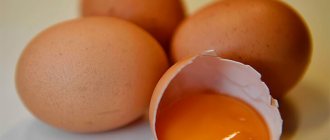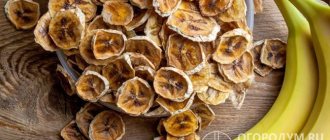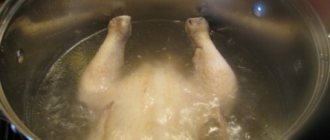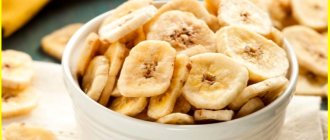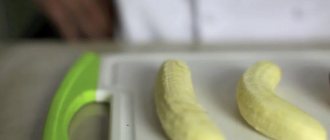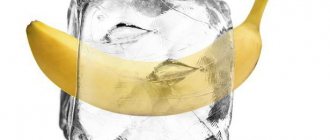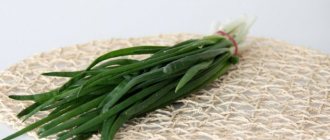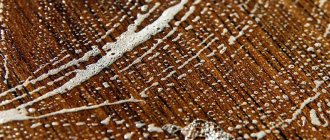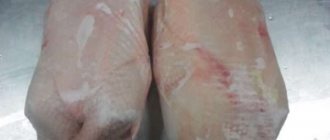Benefits of the peel
The protective shell of a banana includes all the beneficial minerals and substances that the fruit itself contains:
- potassium,
- manganese,
- sodium,
- calcium,
- iron,
- phosphorus.
The main percentage is carbohydrates, with fiber in second place.
There are also harmful substances in the composition, but in small quantities (however, you should still not overeat or rub yourself on banana peels every day).
The interesting composition makes banana skin useful in everyday life and industry. For example, after drying, the peel is used for ink and food coloring (thanks to tannins). Banana “waste” is quite suitable for extracting pectin, and it is a necessary ingredient for thick jellies, jams, etc. And this is not a complete list. Banana peel is even used in folk medicine and cosmetology.
Scientists' stories about the need to wash bananas before eating
Many experts have been telling people for hundreds of years about the great benefits bananas have. It has been proven that these fruits contain a lot of microelements important for the human body. Potassium, magnesium and phosphorus contribute to the proper functioning of many organs, and the carbohydrates contained in a banana provide people with a lot of energy.
Despite the great benefits of bananas, they must be washed very thoroughly before eating. Some scientists even recommend using soap when peeling dirt from bananas. The fact is that exotic fruits go a very long way before they reach store shelves. Bananas are brought to Russia from Ecuador and from other tropical places on the planet.
The countries in which bananas are actively grown are not the richest. But they are the ones who deliver and process these delicious fruits. Thus, bananas are sprayed with various chemicals so that they can maintain their appearance until they arrive at their destination. This is why banana peels should be washed before eating.
Peel danger
The main danger of the peel as a product is its irritating effect on the mucous membranes, the content of hydrogen cyanide, oxalates and saponins. All this is poison for the body.
In addition, during transportation, the dense skin has time to become overgrown with dust, dirt and all types of microbes that are transmitted through the hands. Cholera, dysentery and other dangerous diseases are just the tip of the iceberg. In practice, viruses and microbes of sore throat, acute respiratory infections and acute respiratory viral infections pose a much greater danger. Infection operates in the same way as in public places and at home: we do not control how many times we scratch our lips or rub our nose after “feeling” a banana (or any other object). This is the main reason why you need to wash bananas before eating.
We recommend: Benefits and harms in one clove: should you eat garlic?
There is a second factor. Although bananas are delivered unripe, many of them manage to spoil and the peel becomes loose and susceptible to infections. But the saddest thing is that flies and other parasites freely settle and multiply in such “opened” bananas. Their larvae are almost invisible to the eye (they are born only 0.6 mm in length), they are white and merge with the pulp of the fruit.
Why is quarantine supervision important? Rosselkhoznadzor, which regularly returns consignments of fruit (most often tangerines, but who knows how many larvae or mature flies will manage to move to neighboring boxes of bananas at the port), can best tell you about parasites. Tourists carrying tropical delicacies bypassing veterinary control risk their health quite a lot.
One of these unwanted “guests” is the humpback fly. Its larvae most often reproduce in rotten fruits, do not disdain mushrooms, meat and other products, and are not too lazy to settle a purulent wound. There are species that can reproduce in the intestines or in human skin. In Novorossiysk and Gelendzhik, the main southern ports of Russia, these insects are regularly found in shipments of fruit.
As long as the banana is whole and green, its flesh is safe, but eggs may already be laid on the peel. If the fruit sits there, darkens, and the skin becomes soft, then the larva that has hatched or crawled from a neighboring box will happily begin to feed. When you open a banana, it will end up either on your hands or on the pulp, and along with it in the body. Let us remember that these are tropical parasites, and Russians have no immunity against them.
Quarantine inspection sends back to the tropics all shipments in which parasites were found, but even so there is still a possibility of getting a “guest” into the house. This is especially true in the summer or southern regions.
We recommend: A secret from grandma: treat potatoes with lemon and they won’t get boiled
The Dangers of People Who Don't Wash Bananas Before Eating
Bananas often make their way to other countries without being fully ripe. Because of this, on the road the fruits may begin to rot and deteriorate. Very often such things may not be noticeable to the average person. In a spoiled environment, microorganisms harmful to humans love to multiply.
Sometimes you can see black cracks on the banana peel. They have already become familiar and seem quite normal for the fetus. But the main problem is that these dark spots are the habitats of harmful bacteria and their larvae. If they enter the body, the person may begin to experience stomach pain, diarrhea, or other symptoms of intoxication.
The most dangerous type of insect that can live in banana peels is tropical flies. They lay their larvae in rotting parts of the fruit, and then spread to other products. This type of fly is very harmful due to the substances it carries. These include poisons and other dangerous chemical compounds.
How to protect yourself?
First of all, there is no need to panic. Lionfish are heat-loving insects, and an epidemic is unlikely to threaten your apartment. If the banana peel is whole and not damaged anywhere, it is enough to rinse it under running water - on the smooth surface there is nothing for the larva to cling to, and it will be easily washed off.
The ideal option is to steam it (by the way, this should be done in the store, but who knows if they missed the procedure). So, if you have a steam cleaner or steamer in your home, that’s great. The jet will not cook the pulp, but will clear the skin.
There is an option to douse the skin with Chlorhexidine, but this is probably a bit of a reinsurance. In general, it is enough to wash the fruit with soap.
Dried bananas cannot be purchased in bulk. It is impossible to wash such slices without spoiling their taste, and there is no guarantee how they were cleaned and stored. In factories, bananas are usually washed, and then opened, cut and dried in special cabinets. This is a ready-made snack.
Miss Clean magazine recommends either buying dried bananas in factory packaging, or purchasing fresh, undarkened fruit and drying them yourself, for example, in the oven. This way you will be sure that there are no tropical flies hovering around.
Bananas are guests from the tropics, so it is possible that some exotic parasites and diseases have passed through their peels in stasis. And during the voyage and “rest”, the fruits on the shelves are still covered with dirt. To be sure to avoid intestinal problems (or worse), be sure to wash bananas before eating.
Banana - don't wash it? This is mistake
Should bananas be washed before eating? Each of us knows that before eating, vegetables and fruits must be thoroughly washed, and some even peeled. While washing apples, strawberries or pears is a no-brainer, questions arise when it comes to fruits covered with thick, inedible skins, such as oranges, grapefruits or bananas.
You should never add peeled lemon slices to tea or water! You should always clean them as they are treated before shipping. It turns out that the more shiny the fruit, the more dangerous chemicals it contains.
Dangerous agents are mainly fungicides - organic compounds of sulfur and copper used to combat fungus.
Is it possible to get rid of them by simply peeling the fruit?
It turns out not. We are talking about the possibility of cross-contamination that can occur when the palm comes into contact with an unwashed peel, causing harmful chemicals and dirt to enter the mouth.
Another threat is the protozoan Giardia. The tip of one banana can even contain thousands of protozoan cysts! Now think about whether you need to wash bananas before eating?
The path to illness is even shorter when we eat an apple or a pear, since these are fruits that we most often do not peel. It turns out that simply washing them with water is not enough. These fruits, like citrus fruits, contain wax that is hazardous to health and is not easily washed off. Traders use it to treat fruits to make them look more attractive. Meanwhile, a piece of fruit with wax can lead to abdominal pain, intestinal volvulus, weakness, fever and severe vomiting. But that is not all.
The highly toxic substance imazalil is also popular among sellers - it is a means to prevent mold from fruits transported from abroad. Its exceptionally high concentration is found in oranges and tangerines. This can lead to infertility and even cancer. Therefore, it is better to choose fruits that are ugly, but healthy.
Here are the chemicals that are found on the fruit:
• Pear. On its surface we will find white and yellow beeswax (E 901), carnauba wax (E 903), shellac (E 904), as well as pesticides.
• Apple. It has a shiny shell thanks to wax. It can be washed off, but only with dishwashing detergent.
• Kiwi. Kiwi peel is saturated with strong preservatives, which penetrate the fruit very quickly and can cause poisoning.
• Banana. There are a lot of chemicals and bacteria on it, which during cleaning end up on the fruit.
• Watermelon. On its peel we will find insecticides and microbes, which are the main cause of salmonella.
Remember that fruits must be washed thoroughly before consumption. Even if you washed them at home, do not forget to rinse them again with warm water at work, because bacteria can get on the fruit during transport.
How not to get poisoned? Experts advise using... dishwashing detergent! Only it can remove dangerous impurities.
Are banana snacks healthy?
Banana snacks and chips are a common snack; they are often included in fruit smoothies and dried fruit mixes; they are tasty and appetizing, and contain a lot of fiber.
However, it is important to remember that many store-bought banana chips have typically been fried in oil and contain over 500 calories, which is 5 to 6 times the calories of fresh bananas.
Banana snacks can be made at home by drying banana slices in an electric dryer or dehydrator, but they will still be higher in calories than fresh bananas and should be consumed very sparingly.
Ecuadorian breakfast with green bananas
A popular dish in the homeland of bananas, Ecuador, is patacones, fried green bananas.
Green bananas are cut into pieces, flattened with a special heavy “press” to make small banana “cakes,” fried in boiling oil, sprinkled with coarse salt and served for breakfast with strong, sweet coffee.
Certainly not the healthiest breakfast. But Ecuadorians taste it!
How to eat bananas
Bananas are tasty and healthy in any form. Fresh banana is added to porridge, cottage cheese, ice cream, casseroles, pastries and desserts, and frozen banana makes excellent vegetarian ice cream - by the way, an option for people with intolerance to milk protein and lactose.
All you have to do is cut ripe bananas, put them in a freezer bag or container and put them in the freezer. Then puree the frozen bananas in a blender, decorate as desired and serve.
You can also prepare a banana smoothie by mixing seasonal fruits (tangerines, oranges, bananas) with natural yogurt in a mixer and adding honey if desired.
And if you mix chopped banana with one egg and two spoons of cottage cheese, put it in a microwave-safe dish and put it in the microwave for 2-3 minutes, you will get an excellent fitness casserole.
How to properly wash vegetables and fruits with soda?
Dilute baking soda in the proportion of 1 large tablespoon of baking soda per 1.5 liters of water. Place fruits or vegetables in a deep bowl, basin or pan. Fill with soda water. Wait 12 minutes, drain the solution and rinse the food with clean water.
Interesting materials:
What should you do if your salary is delayed? What to write to a guy when there is nothing to talk about? What should you not do when the thermometer breaks? What should you do if a thunderstorm finds you on a hill? What should you do when you're bored at home? What happens to the skin when it gets sunburned? What is 0 km Vilkovo? What is 1 deciliter? What is 100% Lyocell? What are 2 octaves?
Taste and benefits of bananas
- Bananas are a tasty and nutritious food. It’s not for nothing that athletes often snack on them after training, wanting to restore glucose deficiency.
- They contain the substance ephedrine, which improves the condition of the nervous system and has a positive effect on mental activity.
- Bananas are a source of inulin and pectin, which feed beneficial bacteria in our intestines. In addition, this is one of the few fruits that do not irritate the gastrointestinal tract, so it is recommended to be consumed even for peptic ulcers and gastritis.
- Helps cope with heartburn. They have a slight astringent property and improve the condition of the intestines during diarrhea.
- They contain tryptophan, which, when entering our brain, promotes the production of serotonin, the hormone of joy and happiness.
- Bananas are rich in potassium, which is known to be a sodium antagonist. Potassium helps rid the body of excess fluid, protects our cardiovascular system and is useful for hypertension.
- They enrich the body with useful microelements: potassium, phosphorus, sulfur, calcium, chlorine and magnesium, as well as folic acid.
- Contains melatonin, which speeds up falling asleep and normalizes sleep. It is no coincidence that banana is an excellent product for a light and healthy dinner.
Banana - Asian berry
Banana is a fruit that came to us from antiquity, because it is known that the inhabitants of Southeast Asia consumed it back in the 5th century BC.
True, the name banana can be called a fruit rather arbitrarily, since in fact it is a berry that grows in clusters on banana trees.
There are many varieties of bananas that differ in color (yellow, green and red), size (from small ones the size of a finger to large ones, 40 cm in length) and, of course, taste.
By the way, banana means “finger” in Arabic, which is why we can assume that small bananas were common in ancient Africa and Asia.
Do I need to wash dried fruit?
Before consuming dried fruits, we recommend rinsing them! During the washing process, there is a stage at which they absorb water, thus, during the digestion process, dried fruits will not “take” water from the body.
Interesting materials:
How to find out what CMS the site is made on? How to find out which SSD drive is on? How can I find out if my computer is mining? How to find out the required power supply power? How to find out the Aeroflot e-ticket number? How to find out if Xiaomi firmware is official or not? How to find out opengl or DirectX? How to find out the opengl of a video card? How to find out the operating system of a tablet? How to find out the monitor response?
What happens if you don't wash bananas?
Banana peels are not perfectly clean. Of course, many people understand this fact. But, if you do not wash the peel, tearing the tail, some of the microbes and impurities end up on the pulp. It should also be understood that bananas are stored openly, so there is a huge amount of bacteria and harmful substances on the peel.
When you pick up a banana, microbes immediately form on their surface. And their entry into the body is just a matter of time. Therefore, banal washing is required for bananas before consumption. Most people, having read this information, will try to immediately forget it, but everything is not so simple.

